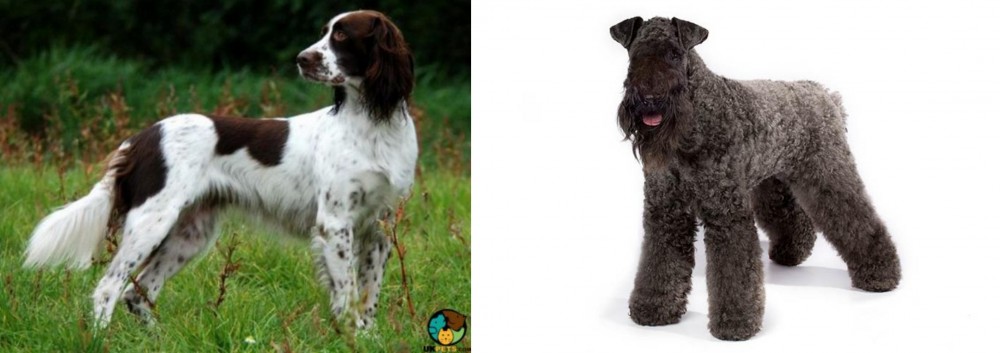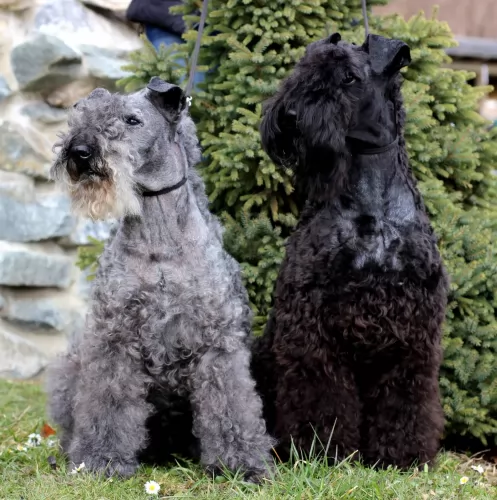 Petzlover
Petzlover French Spaniel is originated from France but Kerry Blue Terrier is originated from Ireland. French Spaniel may grow 12 cm / 5 inches higher than Kerry Blue Terrier. Both French Spaniel and Kerry Blue Terrier are having almost same weight. French Spaniel may live 3 years less than Kerry Blue Terrier. Both French Spaniel and Kerry Blue Terrier has almost same litter size. Both French Spaniel and Kerry Blue Terrier requires Moderate Maintenance.
French Spaniel is originated from France but Kerry Blue Terrier is originated from Ireland. French Spaniel may grow 12 cm / 5 inches higher than Kerry Blue Terrier. Both French Spaniel and Kerry Blue Terrier are having almost same weight. French Spaniel may live 3 years less than Kerry Blue Terrier. Both French Spaniel and Kerry Blue Terrier has almost same litter size. Both French Spaniel and Kerry Blue Terrier requires Moderate Maintenance.
 Developed in France and then in Canada, the French Spaniel is a descendent of 14th century hunting dogs. Originally the breed was very popular with the French royalty and nobility at the Court of Versailles, in the Middle Ages. A French Spaniel named Babe was owned by Catherine I of Russia.
Developed in France and then in Canada, the French Spaniel is a descendent of 14th century hunting dogs. Originally the breed was very popular with the French royalty and nobility at the Court of Versailles, in the Middle Ages. A French Spaniel named Babe was owned by Catherine I of Russia.
Spaniels were mentioned in Gaston III of Foix-Beams’ The Master of the Game, or Livre de Chasse, in 14th Century France. Most believed that Spaniels had been developed during the 11th century Crusades. By 1650 the French Spaniel was differentiated from the King Charles Spaniel and determined to be its own type of spaniel.
In 1805, they were featured in the Sporting Magazine, hunting mallards. The French Spaniel was crossed with English Setters in the !850’s to develop the French Brittany (Spaniel). But by the end of the 19th century, hunting dogs from other countries were outpacing the French Spaniel so much that it was driven to the brink of extinction. Fortunately, a priest named Father Fournier saved the breed by taking all remaining Spaniels to his kennels at St. Hillarie and developing the lines we see in the breed today. This was followed by the founding of the French Spaniel Club in 1921. The various lines of the Spaniels included the French Spaniel of today, the Brittany of today, the Blue Picardy and the Picardy.
The French Spaniel however has been rare outside of its native country and Canada, where it was imported in the 1970’s to French speaking Quebec. Quebec Canadians fell in love with the breed for hunting grouse and woodcock. In order to ensure that the breed would be continued in line with its French standards, the Club de l’Epagneul Francais du Canada began in 1978. By 1985 the Canadian Kennel Club recognized the French Spaniel. Soon after they were recognized by the United Kennel Club, the Federation Cynoloqique Internationale, the UK Kennel Club and the North American Versatile Hunting Dog Association, but not the AKC (American Kennel Club). They are also registered with organizations such as the American Canine Association, the Dog Registry of America and the America’s Pet Registry. They have been included in the AKC Foundation Stock Service as the first step toward AKC recognition.
 The Kerry Blue Terrier hails from Ireland, with the name of the dog coming from a place known as County Kerry, and Blue being the color of the dog's coat.
The Kerry Blue Terrier hails from Ireland, with the name of the dog coming from a place known as County Kerry, and Blue being the color of the dog's coat.
The Kerry Blue was originally bred to control rats, rabbits and otters and was actually a working dog for a host of different jobs.
It was in 1922 that the United States Kerry Blue Terrier Club was founded and recognized by the AKC in 1924.
 The French Spaniel is a very tall dog and as such is one of the spaniel breeds two tallest. They are taller than the English Springer Spaniel, have a deep chest and a muscular build. Their legs are very strong, and they have a thick tail that is never docked. It is long, slightly curved and hangs low. He is an elegant dog with dark amber eyes, long feathery ears, and a nose the color of the coat. If the coat is brown the nose is brown. If the coat is black and white the nose is black. Most French Spaniels are white with brown or dark liver or white with black.
The French Spaniel is a very tall dog and as such is one of the spaniel breeds two tallest. They are taller than the English Springer Spaniel, have a deep chest and a muscular build. Their legs are very strong, and they have a thick tail that is never docked. It is long, slightly curved and hangs low. He is an elegant dog with dark amber eyes, long feathery ears, and a nose the color of the coat. If the coat is brown the nose is brown. If the coat is black and white the nose is black. Most French Spaniels are white with brown or dark liver or white with black.
 The Kerry Blue is a small dog standing at between 44 to 51cm and weighing anything between 15 and 18kg. He has dark eyes which give him that typical alert Terrier expression.
The Kerry Blue is a small dog standing at between 44 to 51cm and weighing anything between 15 and 18kg. He has dark eyes which give him that typical alert Terrier expression.
The ears are small and are carried up before flopping down. The high-set tail has always been customarily docked, giving him a compact, jaunty appearance but these days, the tail tends to be left long, curling somewhat over the back.
He has a coat which is quite wavy or curly and comes in different shades of grey or blue, while the puppies are born black, gradually becoming more blue. The dog is considered to be hypoallergenic as it doesn't shed a lot.
Kerry Blue Terriers are strong willed dogs, but with training and socialization they respond well to instructions such as sit, come, lie-down and stay. As a Terrier breed he is feisty, lively, strong-willed, stubborn, independent and impulsive. They are loyal and affectionate towards their owners and are amicable with children and pets in the home.
Training and socialization develops a balanced attitude around his human family, other animals in the home and around strangers. He is an active dog too so whether he lives in the city or the countryside, he will require a lot of exercise as he is full of life.
You can’t just put him in the backyard and forget about him. He is an intelligent, social dog who will only do well when he is counted in as a family member.
 When you bring a Kerry Blue Terrier into your home and your life, you’re going to have a jaunty, lively, comical pet in your home, as he certainly has the reputation of making people laugh.
When you bring a Kerry Blue Terrier into your home and your life, you’re going to have a jaunty, lively, comical pet in your home, as he certainly has the reputation of making people laugh.
He is such an intelligent dog too and has no difficulty with learning new tricks. He takes his role of watchdog seriously too, as he loves his human family and wants to be looking out for them.
When you bring a Kerry Blue Terrier into your home, you can be assured of jolly good fun from a true canine companion.
 The French Spaniel is a healthy breed that adapts well to all types of conditions, especially wet ones. There are some potentially serious health issues that the breed may be susceptible to:
The French Spaniel is a healthy breed that adapts well to all types of conditions, especially wet ones. There are some potentially serious health issues that the breed may be susceptible to:
This is a very serious inherited disorder. It is one of many Hereditary Sensory Autonomic Neuropathies (HSN) disorders. This is an agonizing infliction that causes the dogs to have no pain in certain extremities and therefore the ability to self-mutilate their feet, pads, claws and digits. They lick and bite their feet often amputating footpads, claws, and digits without feeling any pain. This leads to infection and most dogs end up being euthanized. The disorder shows up by 3-4 months of age.
Make sure the dog’s ears are cleaned regularly to remove wax and prevent infections.
This disease causes seizures but can be treated with medication.
Can cause lameness and arthritis.
 You aren’t going to be running to the vet often with your Kerry Blue as he is a healthy dog breed. However there are some common dog diseases that even the most healthiest of dogs can succumb to.
You aren’t going to be running to the vet often with your Kerry Blue as he is a healthy dog breed. However there are some common dog diseases that even the most healthiest of dogs can succumb to.
Always feed your dog the very best food there is so that he has a strong immune system that can fight off disease.
This is the inward rolling of the eyelid which can irritate the dog’s eye and even cause vision loss. Surgery can treat the problem.
Every dog can succumb to cancer. You may well find a lump or even detect a sore that won’t heal. Treatments for cancer can include medicines, chemotherapy and surgery.
This is an inherited condition to do with the hip joint. It can result in pain for your dog and even lameness. When you discover your pet no longer wants to play and he battles to get up after lying down, he will need to go to the vet. Dogs with this debilitating disease should never be bred.
 A high quality dry food made for puppies and if possible for Spaniels. Feed two to three times a day about one fourth of a cup each time
A high quality dry food made for puppies and if possible for Spaniels. Feed two to three times a day about one fourth of a cup each time
A high quality adult dry food made for Spaniels if possible. Feed twice a day about one half to three fourths of a cup at each meal.
Excellent vision, stamina and speed.
These dog love to run and play. They are smart and learn easily. They like to chase balls, swim, play hide and seek, Find It, and go hiking. They can excel at learning tricks, agility, rally and obedience trials.
 The Kerry Blue’s coat doesn’t shed a lot but it’s a curly coat that will require brushing at least twice a week. He will also require clipping and trimming if you want to keep the coat manageable.
The Kerry Blue’s coat doesn’t shed a lot but it’s a curly coat that will require brushing at least twice a week. He will also require clipping and trimming if you want to keep the coat manageable.
Nutrition is a key part of a healthy Kerry Blue Terrier and instead of just plonking down a bowl of dry kibble every day, make his mealtimes something to look forward to, more sustaining and more interesting.
Top quality kibble is good every now and then but try mixing in some cooked chicken, brown rice, pasta and vegetables occasionally as well as a little bit of raw meat. You will be rewarded with bright eyes, a wet nose, bushy, wagging tail and less trips to the vet.
Make sure there is always a supply of fresh, cool water for him.
Active and lively, your Kerry Blue will need lots of robust exercise – a daily walk as well as ball games which ensure his muscles are kept strong and toned. Not only that, this exercise is important for keeping him fit and also mentally alert.